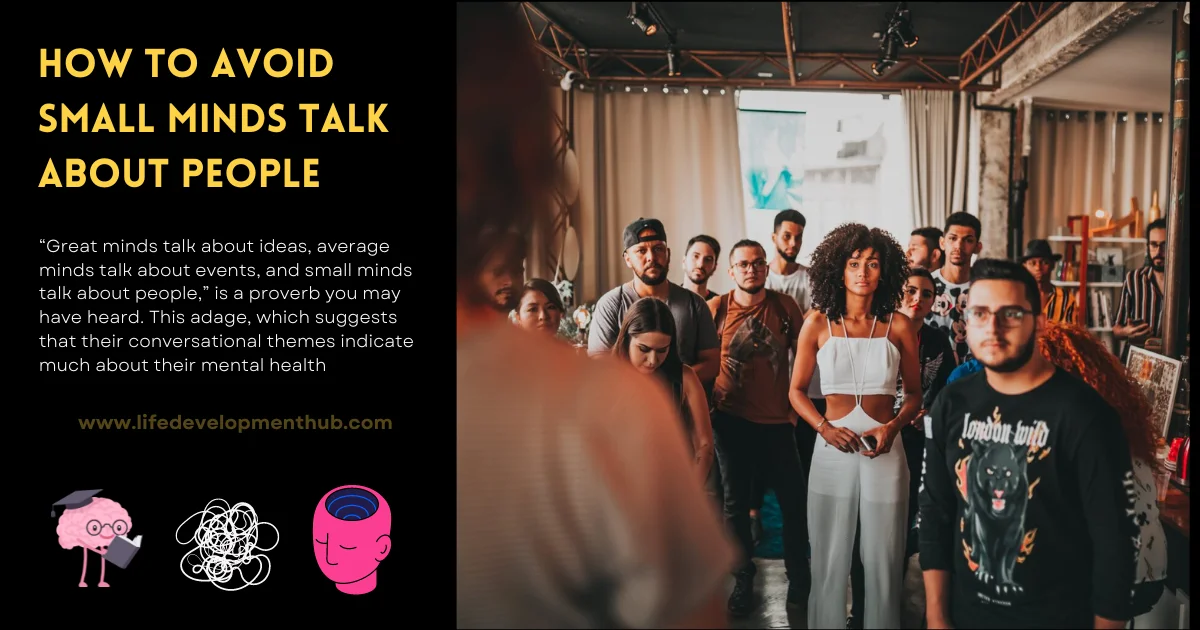“Great minds talk about ideas, average minds talk about events, and small minds talk about people,” is a proverb you may have heard. This adage, which suggests that their conversational themes indicate much about their mental health, has been credited to Eleanor Roosevelt, the former First Lady and noted intelligence.
However, what exactly does it mean to be narrow-minded, and why do some people find it more enjoyable to spread rumors about others rather than engaging in deeper and more beneficial conversations? We will look at the psychology of narrow-mindedness in this essay, along with its drawbacks and strategies for avoiding it. small minds talk about people
Small-mindedness: What Is It?
Small-mindedness is a restricted way of thinking that prioritizes unimportant or surface-level issues. These people tend to think that other people are less than them. They put their own interests ahead of the common good because they lack imagination, curiosity, and an open mind. They also oppose change and the process of learning.
A major sign of narrow-mindedness is a refusal to engage in constructive dialogue about others, even gossip, without causing harm. Rumors can be propagated, secrets can be revealed, and people can be publicly criticized behind their backs—all examples of gossip.
Why Do People Talk About Other People?
There are many reasons why people talk about other individuals, but the following are the more common ones:
To Feel Superior: Many people engage in gossip with the intention of elevating their own prestige or importance by demeaning others. On the other hand, they may chatter as a coping mechanism for their own inadequacies and fears.
To Feel At Home: Some people indulge in gossip in order to build relationships and feel comfortable in their social groupings. They believe that by disseminating knowledge and viewpoints on others, they may cultivate a trusting environment among their peers while upholding group rules and expectations.
To Pass the Time: Some people use gossip as a kind of entertainment and amusement. People may believe that by talking about other people’s lives and troubles, it would enliven or add interest to their own, or they may use it as a coping mechanism for boredom or personal issues.
What Happens When You Talk About Other People?
At first, gossiping may seem innocent and fun, but it can have far-reaching negative effects on both the gossipers and the targets of the gossip. These include: Gossip can harm relationships: When gossip has malicious, erroneous, or exaggerated substance, it can undermine trust between people.
Furthermore, gossiping can backfire on those who spread it by eroding their credibility and integrity and drawing wrath and retaliation from their targets of gossip. It can also cause conflicts, misunderstandings, and resentment between them as well as hurt feelings and reputations of those being gossiped against, making them feel alone and unwanted.
Gossip Decreases Productivity: In the workplace, gossip can be a time and energy waster. Their concentration, productivity, and quality or quantity of work can all be affected. This can lead to an unfavorable work atmosphere when gossipers prioritize chattering above cooperating to accomplish shared objectives.
Mental health can be harmed by gossip: Negative talk about other people has detrimental effects on all parties involved, including the gossipers and the targets of the gossip. In addition to causing tension, anxiety, despair, and low self-esteem on both sides, gossip can also elicit negative feelings like fear, remorse, or jealously. It can also impede social and cognitive skills like critical thinking, creativity, and empathy.
How Are Conversations Avoided?
Here are some tactics that could assist you in avoiding having an exclusive mindset that places all of your attention on other people: small minds talk about people
Be Mindful: Before expressing your opinions, pause and thoroughly consider what you are saying and why. Before speaking out, ask yourself if what you are saying is honest, kind, and necessary; if not, stop yourself. Consider the effects that these remarks might have on other people, as well as your own emotions, if you were in their position.
Be Positive: Spend time recognizing and appreciating the positive features and contributions of others rather than focusing on their flaws. Congratulate them, offer support, praise, and gratitude for everything they have accomplished and been. Additionally, try focusing on the future with hope and optimism rather than lingering on the past.
Be Curios: Talk about concepts, occasions, or experiences that pique your interest and motivate you rather than specific individuals. Expand your horizons through exploration and learn new ideas. Inquire, look for solutions, and share your thoughts while maintaining an open mind toward those who hold views that are different from your own.
Be Constructive: Rather than spreading rumors about other people, consider supporting and assisting them by providing guidance, counsel, or help; come up with solutions and accomplish your objectives; and take responsibility for your own words and deeds by owning up to your mistakes and owning up to them.
Conclusion:
Speaking about others is a surefire way to show narrow-mindedness, which can have detrimental effects on both you and those around you. Be thoughtful, upbeat, inquisitive, and helpful in your talks to avoid becoming one; by doing so, you’ll be able to improve relationships, productivity, and mental health while developing into an amazing person.
Question: How does discussion differ from gossip?
A conversation is defined as any exchange of ideas and information between two or more people; gossip, on the other hand, refers to false comments about individuals.
Is gossip always bad?
A: Not always; there are instances where gossip can be constructive, such as when it compliments someone or offers important or relevant information about someone else. However, gossip turns negative when it targets others or has a malevolent intent.
How can I put an end to someone slandering me online?
A: Try contacting the person who is spreading rumors about you and asking them to stop. Alternatively, you can decide to ignore the person or not interact with them at all. You can also report the rumors to a management, instructor, friend, or family member.

